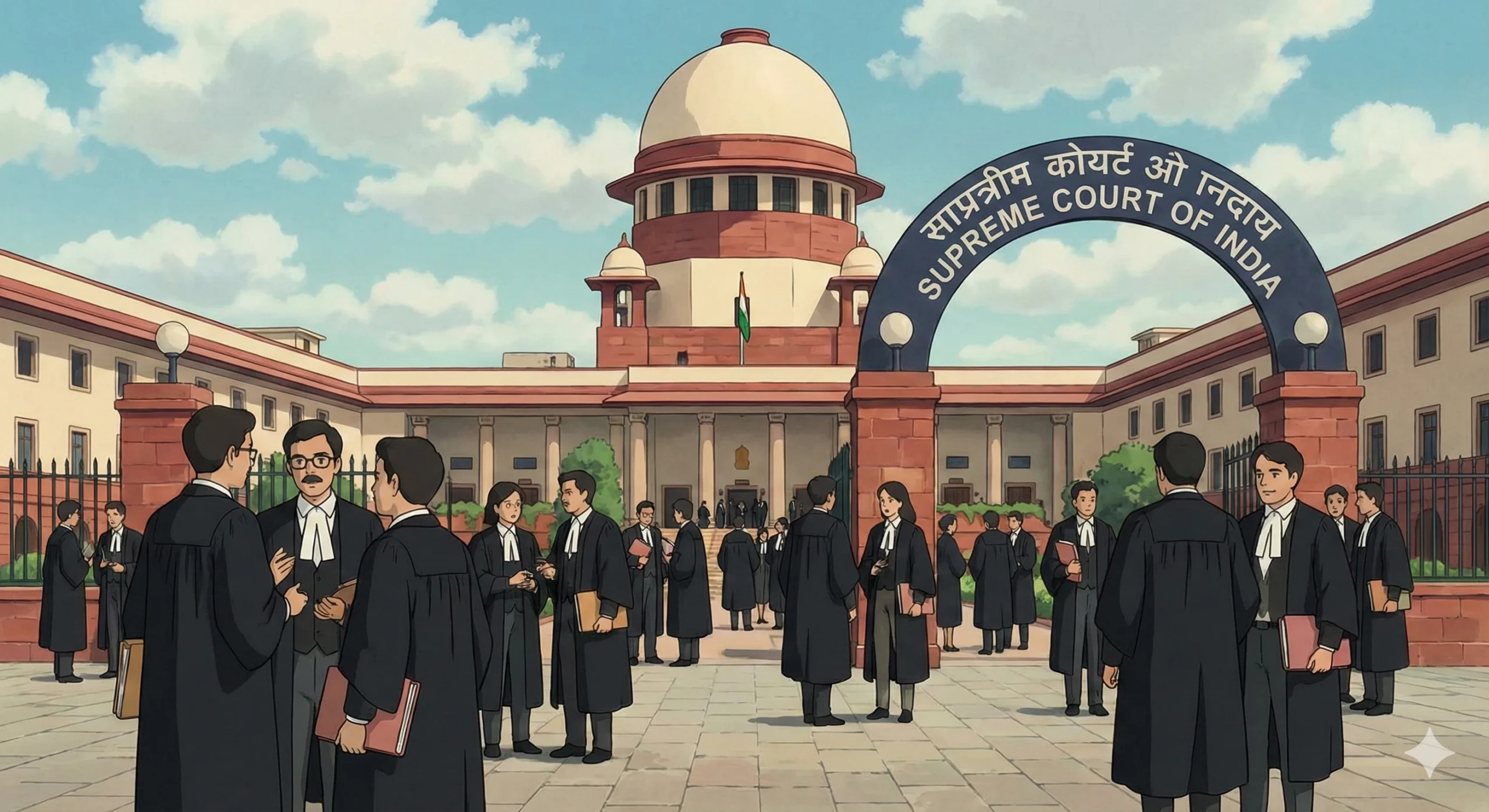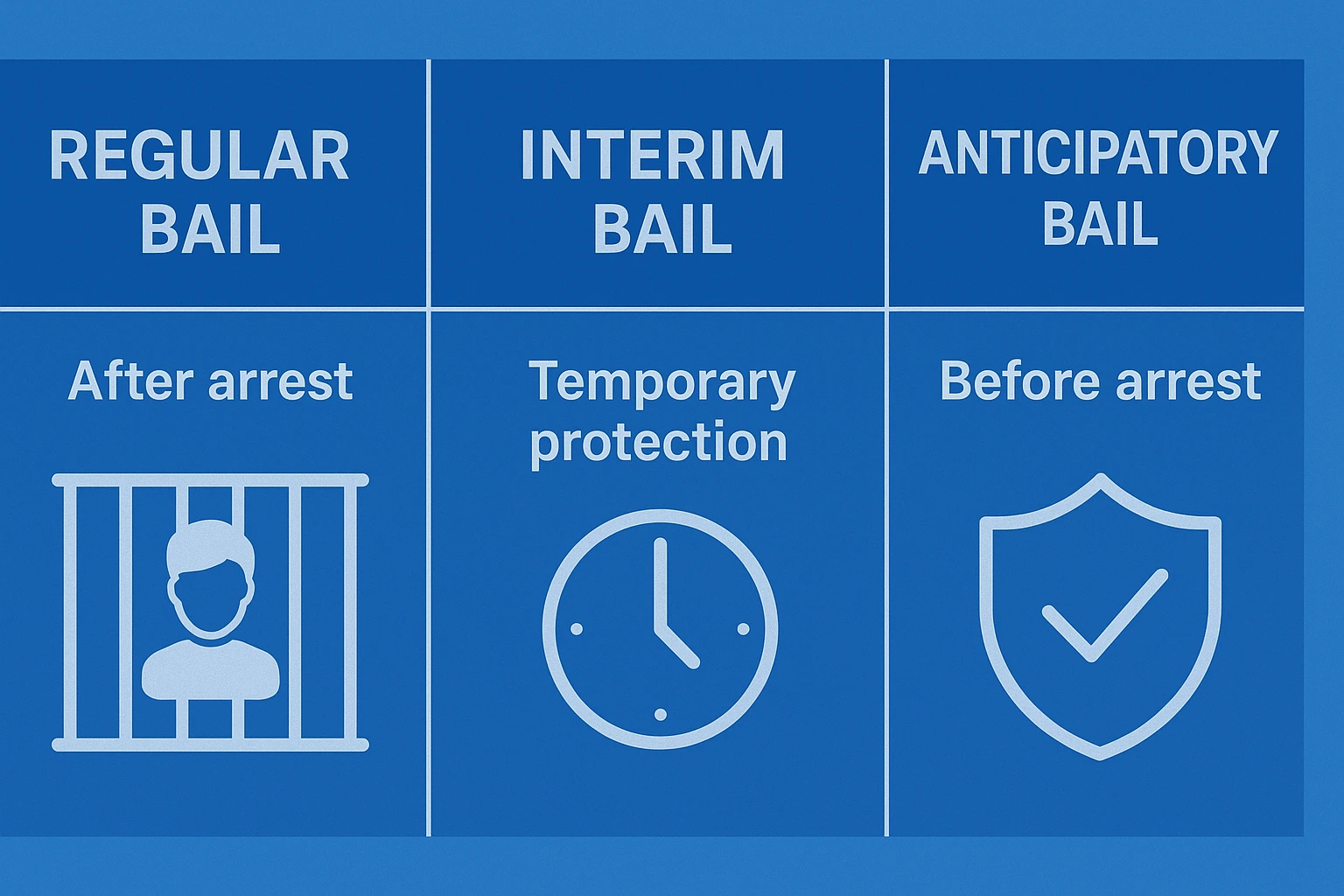
Anticipatory Bail: Meaning, Process, Grounds & Latest Judgments
Introduction
When someone fears arrest — perhaps on the basis of a false or exaggerated complaint, or due to the possibility of being wrongly implicated — the legal remedy of anticipatory bail becomes vital. In Indian criminal jurisprudence, anticipatory bail empowers an individual to seek release on bail before arrest, safeguarding personal liberty and ensuring protection from arbitrary or mistaken arrests.
In this article, we unpack:
- What anticipatory bail means under law
- How, when and where to apply
- What courts consider before granting it
- Key legal precedents and recent developments
- Practical guidance and cautionary points for applicants
What Is Anticipatory Bail?
- Definition & Legal Provision: Under Criminal Procedure Code, 1973 (CrPC), anticipatory bail is provided under Section 438 CrPC. It allows a person who believes they may be arrested for a non-bailable offence to apply to a Court of Session or High Court for a direction that in the event of arrest, they shall be released on bail. (National Crime Investigation Bureau)
- Pre-arrest protection: Unlike regular bail (sought after arrest or detention), anticipatory bail is pre-emptive — it protects against arrest itself. (Wikipedia)
- Discretionary Relief: Grant of anticipatory bail is not automatic or as a matter of right. The court exercises discretion after considering facts, merits, and the balance between individual liberty and interests of justice. (Dharmendra Chawla)
In short: Anticipatory bail is a judicial safeguard — a legal shield for those who fear arrest for a non-bailable offence and believe they may be falsely implicated or unduly harassed.
When and Where Can One Apply for Anticipatory Bail
✅ Eligible Scenario
- When a person has reason to believe they may be arrested on accusation of a non-bailable offence. (Lawyered)
- The fear must be based on realistic grounds — mere vague apprehension may not suffice; courts expect specific circumstances justifying the fear. (Free Law: Get Free Headnotes & Judgments)
🏛️ Appropriate Court
- The application for anticipatory bail must be filed before:
- A Court of Session, or
- A High Court. (National Crime Investigation Bureau)
- Lower courts (Magistrate) typically do not have the power to grant anticipatory bail. (iPleaders)
⏱️ Timing
- It must be filed before any arrest is made.
- Once granted, the order is effective so long as the conditions specified by the court are met — or until modified/revoked. (Cyril Amarchand Blogs)
What Courts Consider Before Granting Anticipatory Bail — Key Grounds
While the power is discretionary, courts have consistently used certain criteria (and case-law) to decide anticipatory bail requests. Some of the major factors:
| Ground / Factor | Why It Matters |
|---|---|
| Nature and gravity of offence | Serious, violent, or societally dangerous offences make bail less likely. (iPleaders) |
| Prima facie evidence / strength of allegations | If the prosecution has strong, credible evidence — bail may be denied. Otherwise, bail is more likely. (Lawyered) |
| Whether accusations appear to be false / motivated by malice or vendetta | Courts aim to protect against misuse of criminal law as a weapon of harassment. (Lawsikho) |
| Past criminal history or antecedents of applicant | First-time accused / clean history favor bail; past record may weigh against. (iPleaders) |
| Risk of tampering with evidence / influencing witnesses / absconding | If court fears interference with justice — bail may be denied or strong conditions imposed. (iPleaders) |
| If investigation doesn’t require custodial interrogation | Custody should be the exception; if no need for police custody, bail may be granted. (Lawsikho) |
Also, courts often impose conditions on anticipatory bail — such as requirement to cooperate with investigation, not leave jurisdiction/country, not tamper with evidence, etc. (Drishti IAS)
Landmark & Recent Judgments: What the Courts Have Ruled
🏛️ Gurbaksh Singh Sibbia v. State of Punjab (1980)
This is the foundational case on anticipatory bail. The court held that anticipatory bail under Section 438 CrPC must be interpreted in light of the constitutional right to personal liberty (Article 21). It recognized that courts have discretion and must balance individual liberty with public interest. (Lawsikho)
🏛️ Siddharam Satlingappa Mhetre v. State of Maharashtra (2011)
The court clarified that anticipatory bail is a “pre-arrest legal process,” and once granted, even if arrest occurs, the accused is entitled to bail. (Lawsikho)
⚖️ 2025 Ruling on Bail Based on Undertakings
In August 2025, the Supreme Court of India (SC) ruled that neither High Courts nor Trial Courts should grant anticipatory bail merely based on undertakings or promises to deposit money or property. Bail applications must be decided strictly on legal merits — not conditional undertakings by the accused or relatives. (SCC Online)
🚫 Restricted Bail Under Particular Laws — Example: SC/ST (Prevention of Atrocities) Act, 1989
On September 1, 2025, the Supreme Court ruled that anticipatory bail is barred in absolute terms under Section 18 of SC/ST Act — except where FIR itself is so frivolous or baseless that no prima facie case is made out. (LawBeat)
These decisions illustrate two important trends: (a) the courts’ attempt to curb misuse of anticipatory bail, and (b) insistence that bail decisions be on merits, not on promises or social status.
How to Apply for Anticipatory Bail: Step-by-Step Process
- Engage a competent criminal lawyer — drafting and presentation matter.
- Collect all relevant material — FIR copy (if any), details of offence, threat information, prior history, proof of residence/employment, identity proofs, background affidavits.
- File application in appropriate court (Session Court / High Court) under Section 438 CrPC. Specify the offence(s), grounds for fear of arrest, and relief sought.
- Court hearing: Court considers merits, asks questions, may direct investigation, may grant interim orders or final order.
- If bail is granted: Abide by conditions — report at intervals, not tamper with evidence, not threaten witnesses, not leave jurisdiction, etc.
- If bail is rejected: Option to reapply (if circumstances change), or apply for regular bail after arrest.
Practical Advice & Cautions for Applicants
- Don’t treat anticipatory bail as a “right.” It’s a discretionary remedy — success depends on facts, evidence, and presentation.
- Avoid blanket or generic applications. Specific facts and credible grounds for fear of arrest improve prospects.
- Never rely solely on monetary or property undertakings — modern precedents disallow bail on that basis alone. (SCC Online)
- Don’t assume anticipatory bail means “immunity.” Bail can be cancelled, revoked, or conditions breached — leading to re-arrest.
- Maintain clean conduct, cooperate with investigation, and abide by all court conditions — helps maintain bail validity.
- If immediately arrested, attend court hearings — avoid being absent, which may lead to cancellation.
Summary: Why Anticipatory Bail Matters
Anticipatory bail is one of the most important legal safeguards in a democratic system. It protects individuals from false or motivated prosecutions, arbitrary arrests, and misuse of power. At the same time, courts safeguard public interest, ensure justice, and prevent misuse by carefully vetting applications.
For someone fearing wrongful arrest, or seeking protection when offences may be non-bailable, a properly argued, well-documented anticipatory bail application can mean the difference between liberty and wrongful incarceration.



Comments (0)